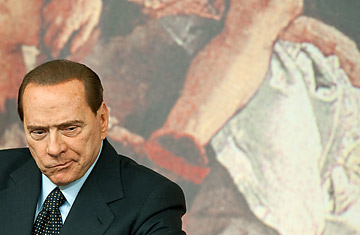
Berlusconi wants people who regularly upload video to the Web to apply for a government license
Hot on the heels of the Google vs. China censorship dispute, a new front in the showdown between state power and Internet freedom is opening in Italy. Prime Minister Silvio Berlusconi's government is pushing through new measures that would give the state control over online video content and force anyone who regularly uploads videos to obtain a license from the Ministry of Communications. The move is seen as yet another challenge to Google — owner of YouTube — which says the new rules would in effect force Internet service providers to police their own content.
The new measures, which are unprecedented among Western democracies, are expected to get final Cabinet approval on Feb. 4 unless opposition parties are able to block them in court. For Berlusconi, this isn't so much an attempt at new media control as it is part of an old story line. The billionaire Prime Minister just happens to own the country's only major private television network, which critics say is a conflict of interest much more troubling for the country than any of his private dalliances or verbal faux pas.
Berlusconi's so-called mediocracy works in two ways. Critics claim that his Mediaset network slants its TV news coverage to favor Berlusconi's political fortunes. At the same time, his parliamentary allies are accused of using the levers of government to give a boost to the gran capo's business interests (which also include publishing, real estate and financial holdings beyond the core television company). Indeed, critics say that Mediaset has relied on favorable legislation in its recent efforts to undercut the Sky Italia satellite TV network set up by Berlusconi's rival, Rupert Murdoch.
The new Internet restrictions, opponents say, are yet another attempt by Berlusconi's party to protect Mediaset's bottom line in the age of online video sharing. "This decree is an enormous gift to Mediaset," says Paolo Gentiloni, a former Communications Minister who is now the opposition's point man on media policy. "We suspect that this maneuver is aimed at slowing the growth of the web's video offerings by a government that has a personal interest in supporting private TV." Dario Denni, head of the Italian Association of Internet Providers, used this analogy to describe the new rule: "It's like assigning responsibility for what drivers do on the road to the highway-maintenance company."
The law could affect individual bloggers and the owners of start-up websites that feature video content, though enforcement over such a wide array of people would be incredibly difficult. Like in China, the government's main target is Google, which is in an ongoing battle with Mediaset over copyright revenue for network programming that winds up on YouTube. The new rules would require Internet service providers to remove content the state deems is in violation of copyright law, or face a fine of up to $210,000. "We are concerned over the fact that Internet service providers, like YouTube, that simply make content available to the general public, are being bundled together with traditional television networks that actually manage content," Marco Pancini, Google's European affairs chief, told the newspaper La Stampa. "It amounts to destroying the entire Internet system."
Berlusconi's allies insist that they are simply responding to a 2007 European Union directive that requires individual countries to set up new media regulations. "The decree does not intend to censor the right to information online, nor to limit the possibility of expressing your ideas and opinions via blogs and social networks," Italy's Vice Minister of Communications, Paolo Romani, said in a statement.
But opponents say the video measure is just one of a series of moves by the government to target what it perceives as unfettered web activity. Prosecutors have leveled criminal charges against four Google executives because a video depicting an ugly episode of school bullying remained on YouTube for several hours in 2006 before it was removed. Interior Minister Roberto Maroni also asked Facebook to shut down two anti-Berlusconi fan pages in recent months — one entitled "Let's Kill Berlusconi" and another set up to praise the mentally ill man who attacked the Prime Minister in Milan in December. In addition, there have been other bills under both the Berlusconi coalition and the former center-left government aimed at regulating blogs and banning anonymity on the Web.
Some say that Italy's ruling class is just struggling to keep pace with the Internet revolution. "Italy's political culture is far removed from new technology," says Luca Conti, 34, a blogger in the coastal city of Senigallia. "They're not even focused yet on how to control the Internet since they haven't even figured out how to use it to their advantage." Case in point: more than 100,000 people attended an anti-Berlusconi rally in Rome last month that was organized on Facebook, but the top opposition politicians snubbed the event. Conti says the country's leaders — left, right and center — are still focused solely on reaching the public via TV and newspapers. And unlike the Internet, the movers and shakers of the old media are some very familiar faces.
